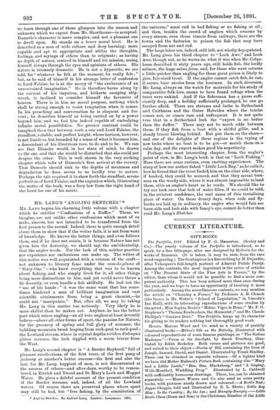MR. LANG'S "ANGLING SKETCHES."*
MR. LANG begins his charming little volume with a chapter which he entitles "Confessions of a Duffer." These, we imagine, are not unlike other confessions which most of us make, sincere, but not intended to be transferred from the first person to the second. Indeed, there is quite enough detail about them to show that if the writer fails, it is not from want of knowledge. He knows the better things, and even follows them, and if he does not attain, it is because Nature has not given him the dexterity, we should say, the ambidexterity, that the angler needs. For the lack of this, neither practice nor experience nor enthusiasm can make up. The writer of this notice was well acquainted with a veteran of the craf t— not unknown to literary fame under the nom-de-plume of "Sixty-One "—who knew everything that was to be known about fishing, and who simply lived for it, all other things being mere distractions to him, and yet could never throw a fly decently, or even handle a fish skilfully. He had not the "use of his hands ; " it was the same want that has some- times hindered a man of brilliant imagination and vast scientific attainments from being a great chemist,—he could not "manipulate." But, after all, we may be taking Mr. Lang in this matter too seriously. Very likely he is more skilful than he makes out. Anyhow, he has the better part which raises angling—as all true anglers at least devoutly believe—above all other forms of sport, the passion for Nature, for the greenery of spring and full glory of summer, the babbling mountain brook leaping from rock-pool to rock-pool ; the Lowland stream, where in crystal depths viridem distinguit glarea museum, the loch rippled with a warm breeze from the West.
Mr. Lang's second chapter is " A Border Boyhood," full of pleasant recollections, of the first trout, of the first pang of jealousy at another's better 911C091313—the first and also the last, for Mr. Lang, happiest of men, is not discontented at the success of others—and after-days, worthy to be remem- bered, in Ettrick and Tweed and St. Mary's Loch and Meggat Water. He gives a doleful account of the present condition of the Border streams, and, indeed, of all the Lowland waters. Of course there are preserved places where sport may still be had, but "free fishing, by the constitution of • AngUng Sketches. Ity Andrew Lang. London : Longmans. 1991.
the universe," must end in bad fishing or no fishing at all ; and then, besides the crowd of anglers which swarms by every stream, even those remote from railways, there are the towns and the factories to poison the fish that may have escaped from net and rod.
The large lakes are, indeed, still left, not wholly depopulated. Mr. Lang gives his third chapter to "Loch Awe," and Loch Awe, though not, as he warns us, what it was when Mr. Coign- houn described it sixty years ago, still holds fish, the lordly salmon, the huge salmo ferox, and, for those who want returns a little quicker than angling for these great prizes is likely to give, fair-sized trout. If the angler cannot catch fish, he can, it seems, hear stories from the boatmen. In such diversion, Mr. Lang, always on the watch for materials for his study of comparative folk-lore, seems to have found refuge when the trout were unkind. And if the fisherman has a purse suffi- ciently deep, and a holiday sufficiently prolonged, he can go further afield. There are streams and lochs in Sutherland and Caithness and the Outer Hebrides where the tourist comes not, or comes rare and unfrequent. It is not quite true that in a Sutherland loch the "expert is no better than the duffer." There may not be much odds between them, if they fish from a boat with a skilful gillie, and a steady breeze blowing behind. But put them on the shore— and one of the delights of these regions is the trying of new lochs where no boat is to be got—or match them on a calm day, and the expert makes good his superiority.
Perhaps the most interesting chapter, from the angler's point of view, in Mr. Lang's book, is that on "Loch Fishing." Here there are some curious, even exciting experiences. The story of how our author fished "Little Loch Beg," as he calls it, how he found that the trout foolecl,him on the clear side, where, if hooked, they could be secured, and that they meant busi- ness on the weedy side, where it was almost impossible to land them, stirs an angler's heart as he reads. We should like to try our luck over that belt of water-lilies, if we could be told,. in the strictest confidence, the real name of this tantalising piece of water. On these dreary days, when rods and fly- books are laid up in ordinary, the angler who would fain see burn-side and loch-side with fancy's eye, cannot do better than read Mr. Lang's Sketches.


































 Previous page
Previous page